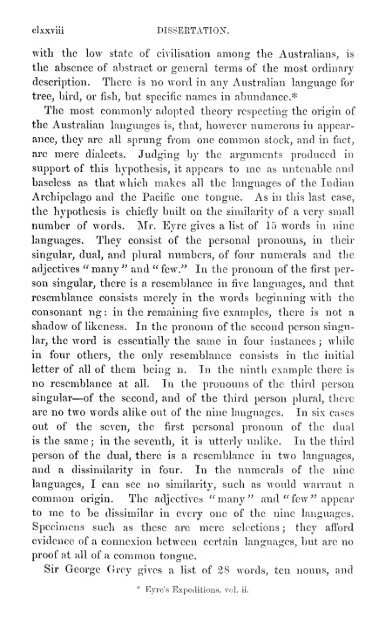A grammar and dictionary of the Malay language : with a preliminary ...
A grammar and dictionary of the Malay language : with a preliminary ...
A grammar and dictionary of the Malay language : with a preliminary ...
You also want an ePaper? Increase the reach of your titles
YUMPU automatically turns print PDFs into web optimized ePapers that Google loves.
clxxYiii DISSERTATION.<br />
<strong>with</strong> <strong>the</strong> low state <strong>of</strong> civilisation among <strong>the</strong> Australians, is<br />
<strong>the</strong> absence <strong>of</strong> abstract or general terms <strong>of</strong> <strong>the</strong> most ordinary<br />
description. There is no word in any Australian <strong>language</strong> for<br />
tree, bird, or fish, but specific names in abundance.*<br />
The most commonly adopted <strong>the</strong>ory respecting <strong>the</strong> origin <strong>of</strong><br />
<strong>the</strong> Australian <strong>language</strong>s is, that, however numerous in appear-<br />
ance, <strong>the</strong>y are all sprung from one common stock, <strong>and</strong> in fact,<br />
are mere dialects. Judging by <strong>the</strong> arguments produced in<br />
support <strong>of</strong> this hypo<strong>the</strong>sis, it appears to me as untenable <strong>and</strong><br />
baseless as that which makes all <strong>the</strong> <strong>language</strong>s <strong>of</strong> <strong>the</strong> Indian<br />
Archipelago <strong>and</strong> <strong>the</strong> Pacific one tongue. As in this last case,<br />
<strong>the</strong> hypo<strong>the</strong>sis is chiefly built on <strong>the</strong> similarity <strong>of</strong> a very small<br />
number <strong>of</strong> words. Mr. Eyre gives a list <strong>of</strong> 15 words in nine<br />
<strong>language</strong>s. They consist <strong>of</strong> <strong>the</strong> personal pronouns, in <strong>the</strong>ir<br />
singular, dual, <strong>and</strong> plural numbers, <strong>of</strong> four numerals <strong>and</strong> <strong>the</strong><br />
adjectives " many " <strong>and</strong> " few." In <strong>the</strong> pronoun <strong>of</strong> <strong>the</strong> first per-<br />
son singular, <strong>the</strong>re is a resemblance in five <strong>language</strong>s, <strong>and</strong> that<br />
resemblance consists merely in <strong>the</strong> words beginning <strong>with</strong> <strong>the</strong><br />
consonant ng : in <strong>the</strong> remaining five examples, <strong>the</strong>re is not a<br />
shadow <strong>of</strong> likeness. In <strong>the</strong> pronoun <strong>of</strong> <strong>the</strong> second person singu-<br />
lar, <strong>the</strong> word is essentially <strong>the</strong> same in four instances ; while<br />
in four o<strong>the</strong>rs, <strong>the</strong> only resemblance consists in <strong>the</strong> initial<br />
letter <strong>of</strong> all <strong>of</strong> <strong>the</strong>m being n. In <strong>the</strong> ninth example <strong>the</strong>re is<br />
no resemblance at all. In <strong>the</strong> pronouns <strong>of</strong> <strong>the</strong> third person<br />
singular—<strong>of</strong> <strong>the</strong> second, <strong>and</strong> <strong>of</strong> <strong>the</strong> third person plural, <strong>the</strong>re<br />
are no two words alike out <strong>of</strong> <strong>the</strong> nine <strong>language</strong>s. In six cases<br />
out <strong>of</strong> <strong>the</strong> seven, <strong>the</strong> first personal pronoun <strong>of</strong> <strong>the</strong> dual<br />
is <strong>the</strong> same ; in <strong>the</strong> seventh, it is utterly unlike. In <strong>the</strong> third<br />
person <strong>of</strong> <strong>the</strong> dual, <strong>the</strong>re is a resemblance in two <strong>language</strong>s,<br />
<strong>and</strong> a dissimilarity in four. In <strong>the</strong> numerals <strong>of</strong> <strong>the</strong> nine<br />
<strong>language</strong>s, I can see no similarity, such as would warrant a<br />
common origin. The adjectives "many" <strong>and</strong> " few " appear<br />
to me to be dissimilar in every one <strong>of</strong> <strong>the</strong> nine <strong>language</strong>s.<br />
Specimens such as <strong>the</strong>se arc mere selections ; <strong>the</strong>y afford<br />
evidence <strong>of</strong> a connexion between certain <strong>language</strong>s, but are no<br />
pro<strong>of</strong> at all <strong>of</strong> a common tongue.<br />
Sir George Grey gives a list <strong>of</strong> 28 words, ten nouns, <strong>and</strong><br />
* Eyre's Expeditions, vol. ii.

















